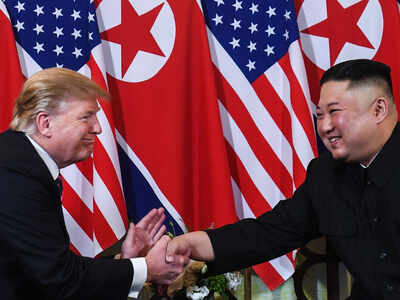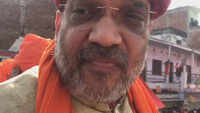
When North Korea launched a volley of projectiles off its east coast on Saturday, it sought to escalate the pressure on President Trump to return to the negotiating table with a compromise on easing sanctions, analysts said, by signalling that it could scuttle his biggest diplomatic achievement with the North.
Saturday's weapons tests were the most serious by the North since the country launched its Hwasong-15 intercontinental ballistic missiles in 2017. Although North Korea has not gone so far as to renege on its moratorium on nuclear and ICBM tests, which its leader, Kim Jong-un, announced last year, the Saturday launch indicated that Kim was toying with the idea of lifting the moratorium, analysts said. Trump has repeatedly described the moratorium as his biggest achievement on North Korea, citing it as proof that his diplomacy with Kim has been working. The leaders have met twice: first in Singapore in June and in Hanoi, in February.
South Korean officials said they were also looking into the possibility that the projectiles were short-range Scud missiles or rockets from multiple-launch tubes - or both.
The potential implications of any short-range missile tests could be far-reaching. The short-range weapons were developed mainly to target South Korea and US military bases there. North Korea also tested weapons in November last year and again last month. But those weapons were largely considered tactical types with very small ranges. By gradually increasing the ranges of weapons tests, Kim appeared to be carefully calibrating his options with Trump. The Hanoi meeting aruptly ended when Trump rejected Kim's suggestion that Washington lift the most painful of sanctions imposed since 2016 in return for a partial dismantlement of its nuclear weapons programme. Trump wanted the quick rollback of the North's entire nuclear weapons programme.
In Seoul, Moon's office expressed "serious concern" that North Korea was violating the spirit of the inter-Korean agreement to ease military tensions that was signed when the South Korean president visited Pyongyang in September. It urged North Korea to return to the negotiating table with the US.
Saturday's weapons tests were the most serious by the North since the country launched its Hwasong-15 intercontinental ballistic missiles in 2017. Although North Korea has not gone so far as to renege on its moratorium on nuclear and ICBM tests, which its leader, Kim Jong-un, announced last year, the Saturday launch indicated that Kim was toying with the idea of lifting the moratorium, analysts said. Trump has repeatedly described the moratorium as his biggest achievement on North Korea, citing it as proof that his diplomacy with Kim has been working. The leaders have met twice: first in Singapore in June and in Hanoi, in February.
American and South Korean authorities were analysing flight data from the tests to identify what types of weapons were launched, the office of President Moon Jae-in of South Korea said. South Korean officials said the "shortrange" projectiles flew only 42 to 124 miles off the North's east coast, ruling out the possibility that the country had resumed tests of intermediate-or intercontinental-range ballistic missiles. Those tests had prompted Trump to threaten to rain "fire and fury" down on the North in 2017.
South Korean officials said they were also looking into the possibility that the projectiles were short-range Scud missiles or rockets from multiple-launch tubes - or both.
The potential implications of any short-range missile tests could be far-reaching. The short-range weapons were developed mainly to target South Korea and US military bases there. North Korea also tested weapons in November last year and again last month. But those weapons were largely considered tactical types with very small ranges. By gradually increasing the ranges of weapons tests, Kim appeared to be carefully calibrating his options with Trump. The Hanoi meeting aruptly ended when Trump rejected Kim's suggestion that Washington lift the most painful of sanctions imposed since 2016 in return for a partial dismantlement of its nuclear weapons programme. Trump wanted the quick rollback of the North's entire nuclear weapons programme.
In Seoul, Moon's office expressed "serious concern" that North Korea was violating the spirit of the inter-Korean agreement to ease military tensions that was signed when the South Korean president visited Pyongyang in September. It urged North Korea to return to the negotiating table with the US.
Download The Times of India News App for Latest World News.
#ElectionsWithTimes
more from times of india news
Elections 2019

Trending Topics
More from TOI
Navbharat Times
Featured Today in Travel
Get the app










